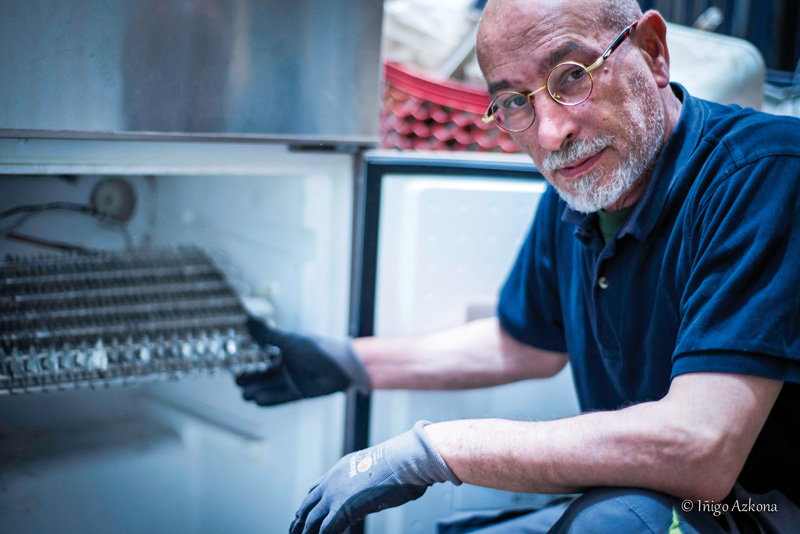"Changing the phone every year doesn't make us happier"
- He spent three years making a documentary about programmed obsolescence. This work, which should be mandatory to see, shows what kind of fraud we live in. Thousands of products are made, planned to fail at any given time. Then we buy a new one.

Cosima Dannoritzer (Dortmund, Germany, 1965) is presenting her latest documentary around the world: Buy, shoot, buy in Spanish or Prêt à jeter in French. It clearly shows that programmed obsolescence is deeply involved in today’s society. However, we also legitimize the system in many ways. Brought by the Cristina Enea Foundation of San Sebastián, we captured it before the screening
You go back and forth presenting the documentary as a sign of its success. Satisfied with the work done?
Oh, yeah, yeah. Sometimes it happens that a documentary is made and released on TV every year, in the early hours of the morning, and then it disappears forever. In this sense I am very happy because they organize screenings, debates and conferences with the documentary as a center, inviting us to one another. I’m very happy because, with the documentary, I wanted to find solutions.
And for those who have never heard of the concept of programmed obsolescence, how would you define it?
It is a technique that is artificially used to make the consumption period of a product shorter than what it actually corresponds to. Consumers will have to change what they bought earlier than they thought for a new one, and it comes from the factory with a scheduled survival.
When and why did you decide to make a documentary on this subject?
I've been thinking about it for a long time. I had heard many legends about products that were never broken, that no one wanted to market them, that they had disappeared and the like. Once again we recorded a recycling area in Barcelona, and while I was there, I saw so many things that I started thinking about myself: “Many of the things that are here probably had a very small problem, and they have been directly thrown away, now we don’t solve anything...” You could see mountains of screens. So I decided that one day I had to start researching a little and clarify once and for all if it was true stories that were spoken or not.
And what conclusions have you reached?
I wanted to find some fun examples that circulated obsolescence in a very creative way. But there were so many cases that we realized at one point that the entire system was infected with this disease. It is one of the pillars of the economy of growth along with credit and advertising. Apart from this, we are more confused about this than it seems, if they put a chip inside that limits the life of an appliance, such as printers, we probably won’t be able to do anything. But on the other hand, if we change the mobile phone every year when the previous one still works well, we are only helping the system. There is also psychological obsolescence.
So it's about throwing away what we have and buying a new one.
Some objects are technically programmed to fail in an instant. Others make them with cheap materials not to last long, and they suggest that we should change them through advertising. They constantly launch new products or create new systems that are often not compatible with the previous ones. In many ways, therefore, they look for the same result: Throw away what you have and buy a new one as soon as possible. In 1950, industrial designer Brooks Stevens defined the concept: “Programmed obsolescence is the desire of the consumer to achieve something new, a little better and a little sooner than necessary.” That's why he brought out new models every year, all the time.
When did all this start?
At the beginning of the consumer society, when mass production began. 1920.eko at the beginning of the decade. With so many things produced, everything became very accessible and people started shopping for the first time for fun. The margins were filled with new things, the shops were up to the top... progression in the end. But the problem was in the minds of the manufacturers, who began to think about what would happen when everyone had everything. In 1928, a very revealing article was published in an advertising magazine. It said: “A product that doesn’t break is a tragedy for the business.” And since they didn’t want tragedies, that’s why they created the planned obsolescence. Shortening the life of the products, people began to constantly replace them, almost unconsciously.
What cases have you studied?
We started looking for the bulb that didn’t break, as well as finding that they created the one that lasted 100,000 hours, then very resistant nylon, cars, computer elements...
Today, to give an example, anything related to computer science, apart from doing it knowing that it will be broken, selling it without saying anything is not a fraud to society?
Programmed obsolescence is a fraud. Create a thing with a limited life, sell it without saying anything, and after I've wasted my money, if it breaks, how can it not be a scam? That’s why they don’t say anything, because they know that if they said, even if it was a little more expensive, having a product to choose that lasts three times longer, that’s what almost everyone would buy. And they're not just fooling us. They also commit fraud on the planet. Returning to the same example, if I have to buy three times in the same period because one thing has been broken, I am creating much more trash than buying one, ruining all the surroundings.
How long can this last?
Serge Latouche, who defends the Growth Theory in the documentary, says: “There can be no unlimited growth on a limited planet.” We don't need to be Einstein to understand that. At first the idea of obsolescence seemed good. Everything was going up and prices were going down, there was a lot of work... but we realized that it has no future. It is only a matter of time before the raw materials are wasted, and we have to find other things to deal with this situation.
You defend responsible consumption.
Consumption does not lead to absolute happiness. This is a conclusion that some people have come to a long time ago. We consume much more than our predecessors, and the level of happiness has not increased as much. Other studies indicate that even if you had a lot more money than you have, the increase in happiness would not be proportional. Responsible consumption goes hand in hand with what we really need. Home, food, work –if possible interesting–, friends, the possibility of traveling, a good health system... These are the primary needs. We should consume it with these parameters and try to keep them well-balanced. Changing mobile phones every year doesn’t make us happier.
And what can we do?
This is the discussion that interests me the most. For example, if we change our mobile phone every two years instead of every year, we would halve our electronic scrap. Try to fix something if it’s messed up, insist on vendors saying it’s better to buy a new one instead of just having to spend a little more money for yourself, buy better devices together... Some are involved in fashion, others in politics, law... and even from these areas things can be done. Also on social networks. If we put in a website how long the things we buy have lasted for us, the database would be huge.
It sounds so simple, but don’t you think we think the problem is too big for us?
That's very easy to think about. That companies are very strong, that politicians do nothing, and that as individual people we are nothing... If we all stayed longer with our objects, the effect would multiply and we would have much less garbage. The case of the iPod is mentioned in the documentary. The first ones that were manufactured were prepared to last only 18 months and were looking to buy new ones by dissipating the battery. The case began to spread with a video posted on Youtube. They were two young people who were frustrated and made the video with fun music to inform people. Five million people saw it and ended up making a collective denunciation, as well as obtaining very positive results: They had to install a battery replacement service, extend the warranty...
It's amazing, because that's what happened to me. It was damaged by the battery months after I finished the warranty... and I had to buy a new one.
That’s what Apple was looking for. In the video above we see how the author calls and how they explain to him that they don’t, they don’t make battery changes. In the end, they tell him to buy a new one, which will be cheaper than doing anything else. They were designed so that they could not be repaired. The design should also help for the repair, and if you ever have to throw it in the trash, separate the parts and make it easy to recycle, otherwise we will fill everything with trash.
Have you had any trouble making this documentary?
No, I don't. If I were the protagonist of a movie, now they would call me to say “we’re going to make you disappear”, but no, I’m fine. Some have told me that they do not agree with me, for example, that in the case of the 1,000 hour light bulb, the balance between material and electricity consumption is perfect, and everything is not so easy... And since I don’t agree with that, I respond to them, but see, those who criticize me are also getting into the debate because others respond to them, etc.
Do you think that even if the problem is present, this secret engine of the economy can be stopped?
I think things are starting to change. They start to make products that last, some magazines talk about what products last, people start talking about the topic... The crisis is also here and we can’t buy as much as before. If we do not prepare the change now, we will have to do it when the raw materials are dissipated. Some have found that consumption does not bring happiness, and that working so much to live in the face of purchasing power does not interest them so much. Some prefer to work a little less, buy less with a little less money, but have more time to do things of interest or be with friends. I think psychology is changing.
Has the crisis had an impact? We have less money, but we are also encouraged to change what is right with so many plans...
They want us to buy more and they almost make us feel guilty if we haven’t bought it as much as we did last year. The problem for many is that they think that the system should remain the same, and the fact is that we have reached the limit. The crisis is here, but we all have everything. Why do we have to keep buying and replacing the things we have? At least the crisis makes us think.
You were in Ghana filming a garbage dump for the documentary. How would you describe what you saw there?
As the locals told us, the area we saw before was a very natural area with a stream with many fish. He had a fishing village nearby. But now it looks like hell. It has no end, everywhere you see computers and pieces of computers. Smoke is observed at some points, it is the smoke produced by those who seek metal by igniting the plastic. Something we absolutely do not want, the dark side of the consumer society at all. Because it’s far away, we don’t often worry. But yes, it’s huge and because it often rains hard, the toxic material is absorbed by the earth to then end up in the sea. It's the cycle. The future will be like this if we don't deal with it. We're gonna have a lot of places like this.
Is there a country in this area that we should consider as exemplary?
We should learn different things from different countries. We can learn from India, for example, where it is unthinkable that something should be thrown out because it has broken down. They fix it and have few tools. We can learn from Ghana that we can live each year without changing over the phone. We can learn from Germany how they share washing machines, for example, for complete buildings and that they live well. We can learn a lot from some legal cases in the U.S. where consumers gather and file lawsuits. In Spain the people on the Internet exchange information with a lot of anger and energy. The degrowth movement in France has a political party... We don’t need everyone to start doing everything, everyone will find something that he or she can do and doing it would be valuable for everyone.
Well, my blue hair first came out. It seems silly, but I do not know, it seemed to me that something useful could come out of this symbolic burden, for example, he reminded me that, after 23 years of accepting my body – not always loving it – I will also have to learn to... [+]
Frantziako Diputatuen Ganberak adostu du zigor penalak jarriko dizkietela produktuak iraupen-muga jakin batekin fabrikatzen dituztenei. Zaharkitzapen programatuaren zigorra, bi urteko kartzela eta 30.000 euro arteko isuna izan daiteke Ecoportal webguneak argitaratu duenez.









.jpg)





